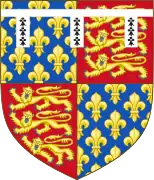House of Beaufort
The House of Beaufort /ˈboʊfərt/[1] is an English noble family, which originated in the fourteenth century and played an important role in the Wars of the Roses in the fifteenth century. The name Beaufort refers to Montmorency-Beaufort (France, département de l'Aube, Champagne), once the possession of John of Gaunt, 1st Duke of Lancaster, third son of King Edward III.
| House of Beaufort | |
|---|---|
.svg.png.webp) Arms of Beaufort | |
| Parent house | House of Plantagenet (legitimised) |
| Country | Kingdom of England |
| Founded | 1373 |
| Founder | John Beaufort, 1st Earl of Somerset |
| Current head | Henry Somerset, 12th Duke of Beaufort |
| Titles |
|
| Cadet branches |
|
The family is descended from John of Gaunt by his then-mistress Katherine Swynford. Gaunt married Swynford in 1396, and their children were legitimized by Richard II and Pope Boniface IX. They had four children: John (1373–1410), Henry (1375–1447), Thomas (1377–1426), and Joan (1379–1440).[2] The House of Tudor was descended from the Beauforts in the female line and all subsequent English and British monarchs are descended from the Tudors.
The House of Beaufort continues to exist; its members now use Somerset as their surname. The current, 12th Duke of Beaufort is Henry Somerset, a direct male-line descendant of Henry II.
History
The Beauforts were a powerful and wealthy family from the start, and rose to greater power after their half-brother and uncle became King Henry IV in 1399. However, in 1406, Henry IV decided that although the Beauforts were legitimate, their genetic line could not be used to make any claim to the throne. John Beaufort had already been created Earl of Somerset in 1397. His second son John became the first Duke of Somerset in 1443.[2]
The second son (of John of Gaunt), Henry, became a bishop, Lord Chancellor, and a Cardinal; the third son, Thomas, became Duke of Exeter; and the daughter, Joan, married Ralph Neville, 1st Earl of Westmorland. Joan had the most pedigree, her many descendants including the Dukes of York, Warwick the "Kingmaker", the Dukes of Norfolk, the Dukes of Buckingham, the Earls of Northumberland, and Henry VIII's last queen, Catherine Parr.
When the dynastic struggle known as the Wars of the Roses broke out in the later fifteenth century, the Beauforts were the chief supporters of Henry VI and the House of Lancaster.[3]
Henry VII traced his claim to the English crown through his mother, Margaret Beaufort, granddaughter of John Beaufort, and great-granddaughter of John of Gaunt.
The Beauforts suffered heavily in the Wars of the Roses. Edmund Beaufort, 2nd Duke of Somerset and his three elder sons were killed in the war, leaving no legitimate male heir. The male line was continued through Charles Somerset, 1st Earl of Worcester, illegitimate son of Henry Beaufort, 3rd Duke of Somerset.
Henry Somerset, 3rd Marquess of Worcester (1629–1700) was the great-great-great-great-grandson of Charles Somerset. He assisted in the Restoration to the throne of Charles II. In 1682, Charles created Henry Somerset the first Duke of Beaufort.[2]
The Beaufort family in the male line is today represented by its cadet branch the House of Somerset, whose senior dynast is Henry Somerset, 12th Duke of Beaufort.
Notable Beauforts
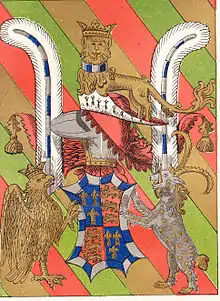
These included:
- John Beaufort, 1st Earl of Somerset (c. 1371–1410).
- Henry Beaufort, 2nd Earl of Somerset (c. 1401–1418).
- John Beaufort, 1st Duke of Somerset (c. 1404–1444).
- Margaret Beaufort, Countess of Richmond and Derby (1443–1509), mother of King Henry VII of England
- Joan Beaufort, Queen of Scotland (c. 1404–1445)
- Thomas Beaufort, Count of Perche (c. 1405–1431)
- Edmund Beaufort, 2nd Duke of Somerset (c. 1406–1455).
- Henry Beaufort, 3rd Duke of Somerset (1436–1464).
- Margaret Beaufort, Countess of Stafford (c. 1427–1474)
- Edmund Beaufort, 4th Duke of Somerset (c. 1438–1471).
- John Beaufort, Marquess of Dorset (c. 1455–1471)
- Margaret Beaufort, Countess of Devon (1409–1449)
- Henry Beaufort (c. 1375–1447), Cardinal Bishop of Winchester
- Thomas Beaufort, Duke of Exeter (c. 1377–1426)
- Joan Beaufort, Countess of Westmorland (c. 1379–1440)
- Cecily Neville, Duchess of York (1415–1495), mother of Kings Edward IV and Richard III of England
Family tree
| Family tree | ||||||||||||||||||||||||||||||||||||||||||||||||||||||||||||||||||||||||||||||||||||||||||||||||||||||||||||||||||||||||||||||||||||||||||||||||||||||||||||||||||||||||||||||||||||||||||||||||||||||||||||||||||||||||||||||||||||||||||||||||||||||||||||||||||||||||||||||||||||||||||||||||||||||||||||||||||||||||||||||||||||||||||||||||||||||||||||||||||||||||||||||||||||||||||||||||||||||||||||||||||||||||||||||||||||||||||||||||||||||||||||||||||||||||||||||||||||||||||||||||||||||||||||||||||||||||||||||||||||||||||||||||||||||||||||||||||||||||||||||||||||||||||||||||||||||||||||||||||||||||||||||||||||||||||||||||||||||||||||||||||||||||||||
|---|---|---|---|---|---|---|---|---|---|---|---|---|---|---|---|---|---|---|---|---|---|---|---|---|---|---|---|---|---|---|---|---|---|---|---|---|---|---|---|---|---|---|---|---|---|---|---|---|---|---|---|---|---|---|---|---|---|---|---|---|---|---|---|---|---|---|---|---|---|---|---|---|---|---|---|---|---|---|---|---|---|---|---|---|---|---|---|---|---|---|---|---|---|---|---|---|---|---|---|---|---|---|---|---|---|---|---|---|---|---|---|---|---|---|---|---|---|---|---|---|---|---|---|---|---|---|---|---|---|---|---|---|---|---|---|---|---|---|---|---|---|---|---|---|---|---|---|---|---|---|---|---|---|---|---|---|---|---|---|---|---|---|---|---|---|---|---|---|---|---|---|---|---|---|---|---|---|---|---|---|---|---|---|---|---|---|---|---|---|---|---|---|---|---|---|---|---|---|---|---|---|---|---|---|---|---|---|---|---|---|---|---|---|---|---|---|---|---|---|---|---|---|---|---|---|---|---|---|---|---|---|---|---|---|---|---|---|---|---|---|---|---|---|---|---|---|---|---|---|---|---|---|---|---|---|---|---|---|---|---|---|---|---|---|---|---|---|---|---|---|---|---|---|---|---|---|---|---|---|---|---|---|---|---|---|---|---|---|---|---|---|---|---|---|---|---|---|---|---|---|---|---|---|---|---|---|---|---|---|---|---|---|---|---|---|---|---|---|---|---|---|---|---|---|---|---|---|---|---|---|---|---|---|---|---|---|---|---|---|---|---|---|---|---|---|---|---|---|---|---|---|---|---|---|---|---|---|---|---|---|---|---|---|---|---|---|---|---|---|---|---|---|---|---|---|---|---|---|---|---|---|---|---|---|---|---|---|---|---|---|---|---|---|---|---|---|---|---|---|---|---|---|---|---|---|---|---|---|---|---|---|---|---|---|---|---|---|---|---|---|---|---|---|---|---|---|---|---|---|---|---|---|---|---|---|---|---|---|---|---|---|---|---|---|---|---|---|---|---|---|---|---|---|---|---|---|---|---|---|---|---|---|---|---|---|---|---|---|---|---|---|---|---|---|---|---|---|---|---|---|---|---|---|---|---|---|---|---|---|---|---|---|---|---|---|---|---|---|---|---|---|---|---|---|---|---|---|---|---|---|---|---|---|---|---|---|---|---|---|---|---|---|---|---|---|---|---|---|---|---|---|---|---|---|---|---|---|---|---|---|---|---|---|---|---|---|---|---|---|---|---|---|---|---|---|---|---|---|---|---|---|---|---|---|---|---|---|---|---|---|---|---|---|---|---|---|---|---|---|---|---|---|---|---|---|---|---|---|---|---|---|---|---|---|---|---|---|---|---|---|---|---|---|---|---|---|---|---|---|---|---|---|---|---|---|---|---|---|---|---|---|---|---|---|---|---|---|---|---|---|---|---|---|---|---|---|---|---|---|---|---|---|---|---|---|---|---|---|---|---|---|---|
| ||||||||||||||||||||||||||||||||||||||||||||||||||||||||||||||||||||||||||||||||||||||||||||||||||||||||||||||||||||||||||||||||||||||||||||||||||||||||||||||||||||||||||||||||||||||||||||||||||||||||||||||||||||||||||||||||||||||||||||||||||||||||||||||||||||||||||||||||||||||||||||||||||||||||||||||||||||||||||||||||||||||||||||||||||||||||||||||||||||||||||||||||||||||||||||||||||||||||||||||||||||||||||||||||||||||||||||||||||||||||||||||||||||||||||||||||||||||||||||||||||||||||||||||||||||||||||||||||||||||||||||||||||||||||||||||||||||||||||||||||||||||||||||||||||||||||||||||||||||||||||||||||||||||||||||||||||||||||||||||||||||||||||||
Coats of arms
| Arms | Name | Life | Blazon | Notes |
|---|---|---|---|---|
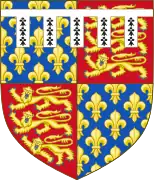 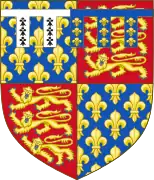 |
Henry Bolingbroke, Duke of Hereford and Lancaster (later King Henry IV) |
1366–1413 | As Duke of Hereford:
Quarterly, 1st and 4th, France ancien, 2nd and 3rd England, with a label of five points ermine (Richmond)[5]
Quarterly, 1st and 4th, France ancien, 2nd and 3rd England, with a label of five points two of ermine (Richmond) and three Azure flory Or (Lancaster)[5] |
Son of: John of Gaunt, Duke of Lancaster and Blanche of Lancaster. |
.svg.png.webp) 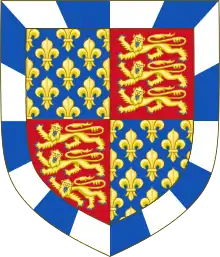 |
John Beaufort, Earl of Somerset | 1373–1410 | Per pale, Argent and Azure, over all on a bend Gules three lions passant guardant Or with a label of three points Azure each charges with three fleur de lys Or[6]
Quarterly, 1st and 4th, France ancien, 2nd and 3rd England, within a bordure componée Argent and Azure[6] |
Illegitimate Son (legitimated in 1396) of: John of Gaunt, Duke of Lancaster and Katherine Swynford.
See: House of Beaufort |
 |
Henry Beaufort, Cardinal of St. Eusebius and Bishop of Winchester | 1374–1447 | Quarterly, 1st and 4th, France ancien, 2nd and 3rd England, within a bordure componée Argent and Azure[7] | Illegitimate Son (legitimated in 1396) of: John of Gaunt, Duke of Lancaster and Katherine Swynford. |
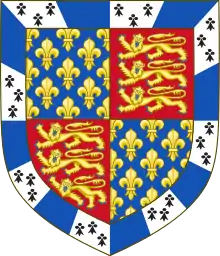 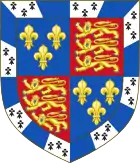 |
Thomas Beaufort, Duke of Exeter | 1377–1426 | Quarterly, 1st and 4th, France ancien, 2nd and 3rd England, within a bordure componée Azure and Ermine[8] | Illegitimate Son (legitimated in 1396) of: John of Gaunt, Duke of Lancaster and Katherine Swynford. |
 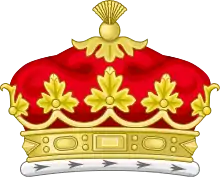 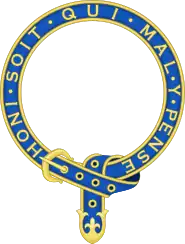 |
   |
.svg.png.webp)   |
|---|---|---|
| Colour key (Line of descent) |
|---|
Monarchs
Paternal descent
Maternal descent
Consorts
Illegitimate descent
Collaterals
|
Descendants of John Beaufort, 1st Earl of Somerset
| Arms | Name | Life | Blazon | Notes |
|---|---|---|---|---|
.svg.png.webp)  |
John Beaufort, Earl of Somerset | 1373–1410 | Per pale, Argent and Azure, over all on a bend Gules three lions passant guardant Or with a label of three points Azure each charges with three fleur de lys Or[6]
Quarterly, 1st and 4th, France ancien, 2nd and 3rd England, within a bordure componée Argent and Azure[6] |
Illegitimate Son (legitimated in 1396) of: John of Gaunt, Duke of Lancaster and Katherine Swynford. |
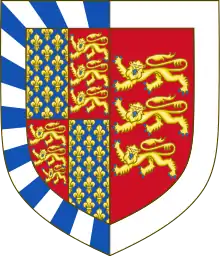 |
Margaret Holland, Countess of Somerset | 1385–1439 | Quarterly, 1st and 4th, France ancien, 2nd and 3rd England, within a bordure componée Argent and Azure, impaling, Gules, three lions passant guardant Or, within a bordure Argent[6] | Daughter of: Thomas Holland, Earl of Kent and Alice Holland, Countess of Kent
Married to: John Beaufort, Earl of Somerset; 1399–1410 Married to: Thomas of Lancaster, Duke of Clarence; 1411–1421 |
| Arms | Name | Life | Blazon | Notes |
|---|---|---|---|---|
.svg.png.webp) |
John Beaufort, Duke of Somerset | 1403–1444 | Quarterly, 1st and 4th, France moderne, 2nd and 3rd England, within a bordure componée Argent and Azure[9] | Son of: John Beaufort, Earl of Somerset and Margaret Holland. |
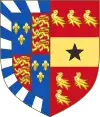 |
Margaret Beauchamp | 1406–1482 | Quarterly, 1st and 4th, France moderne, 2nd and 3rd England, within a bordure componée Argent and Azure, impaling, Gules, on a fess Or a mullet Sable, between six martlets, three, two and one, of the second (Beauchamp)[9] | Daughter of: John Beauchamp of Bletso and Edith Stourton.
Married to: Sir Oliver St John, of Bletsoe; 1425–1437. Married to: John Beaufort, Duke of Somerset; 1439–1444. Married to: Lionel de Welles, Baron Welles; 1447–1461. |
| Arms | Name | Life | Blazon | Notes |
|---|---|---|---|---|
.svg.png.webp) 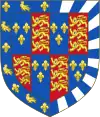 |
Lady Margaret Beaufort | 1443–1509 | Quarterly, 1st and 4th, France moderne, 2nd and 3rd England, within a bordure componée Argent and Azure[10]
Quarterly, France moderne and England, a bordure Azure charged alternatively with fleurs de lys and martlets Or, impaling, Quarterly, 1st and 4th, France moderne, 2nd and 3rd England, within a bordure componée Argent and Azure[10] |
Daughter of: John Beaufort, Duke of Somerset and Margaret Beauchamp.
Married to: Edmund Tudor, 1st Earl of Richmond; 1455–1456. Married to: Sir Henry Stafford; 1462–1471. Married to: Thomas Stanley, Earl of Derby; 1472–1504. |
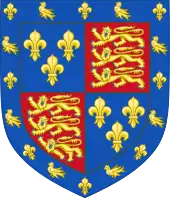 |
Edmund Tudor, Earl of Richmond | 1430–1456 | Quarterly, France moderne and England, a bordure Azure charged alternatively with fleurs de lys and martlets Or[10] | Son of: Sir Owen Tudor and Catherine of Valois.
Half brother to King Henry VI, legitimated by Parliament in 1453. |
| Arms | Name | Life | Blazon | Notes |
|---|---|---|---|---|
 .svg.png.webp) |
Henry Tudor, Earl of Richmond (later King Henry VII) |
1457–1509 | Quarterly, France moderne and England, a bordure Azure charged alternatively with fleurs de lys and martlets Or[11]
Quarterly, 1st and 4th, France moderne, 2nd and 3rd England[12] |
Son of: Edmund Tudor, Earl of Richmond and Lady Margaret Beaufort.
Defeats King Richard III at the Battle of Bosworth Field in 1485, claims the throne as King Henry VII. See: House of Tudor |
.svg.png.webp) 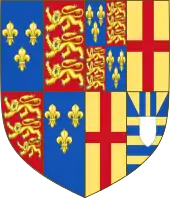 |
Elizabeth of York | 1466–1503 | Quarterly, 1st, quarterly, 1st and 4th, France moderne, 2nd and 3rd England, 2nd and 3rd de Burgh, 4th Mortimer[13] | Daughter of: King Edward IV and Elizabeth Woodville.
Married to: King Henry VII; 1486–1503. Heiress of the House of York. |
References
- https://www.dictionary.com/browse/beaufort
- Chisholm 1911.
- Amin, Nathen. "The Wars of the Roses: York v Beaufort?", History Extra, The official website for BBC History Magazine and BBC World Histories Magazine. Accessed 25 October 2018.
- Planche, J.R., Pursuivant of Arms, 1851, p.xx
- Pinches & Pinches 1974, p. 86.
- Pinches & Pinches 1974, p. 81.
- Pinches & Pinches 1974, p. 84.
- Pinches & Pinches 1974, p. 85.
- Pinches & Pinches 1974, p. 82.
- Pinches & Pinches 1974, p. 127.
- Pinches & Pinches 1974, p. 132.
- Pinches & Pinches 1974, p. 133.
- Pinches & Pinches 1974, p. 134.
- Attribution
![]() This article incorporates text from a publication now in the public domain: Chisholm, Hugh, ed. (1911). "Beaufort". Encyclopædia Britannica. 3 (11th ed.). Cambridge University Press.
This article incorporates text from a publication now in the public domain: Chisholm, Hugh, ed. (1911). "Beaufort". Encyclopædia Britannica. 3 (11th ed.). Cambridge University Press.
- Bibliography
- Ailes, Adrian (1982), The Origins of The Royal Arms of England, Reading: Graduate Centre for Medieval Studies, University of Reading, ISBN 0704907763
- Amin, Nathen (2017), The House of Beaufort, The Bastard Line That Captured The Crown, Stroud: Amberley, ISBN 9781445684734
- Brooke-Little, J.P., FSA (1978) [1950], Boutell's Heraldry (Revised ed.), London: Frederick Warne LTD, ISBN 0-7232-2096-4
- Fox-Davies, Arthur (1978) [1909], Complete Guide to Heraldry (Revised ed.), New York: Bonanza Books, ISBN 1602390010
- Louda, Jiří; Maclagan, Michael (1981), Heraldry of the Royal Families of Europe, United States of America: Clarkson N. Potter, Inc., ISBN 0517545586
- Pinches, John Harvey; Pinches, Rosemary (1974), The Royal Heraldry of England, Heraldry Today, Slough, Buckinghamshire: Hollen Street Press, ISBN 0-900455-25-X
